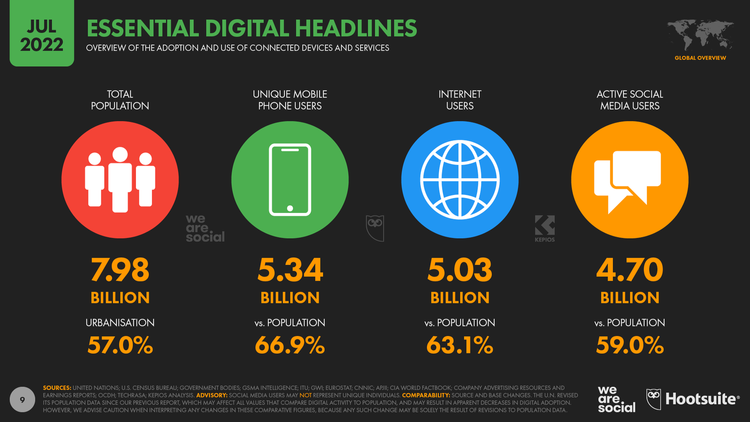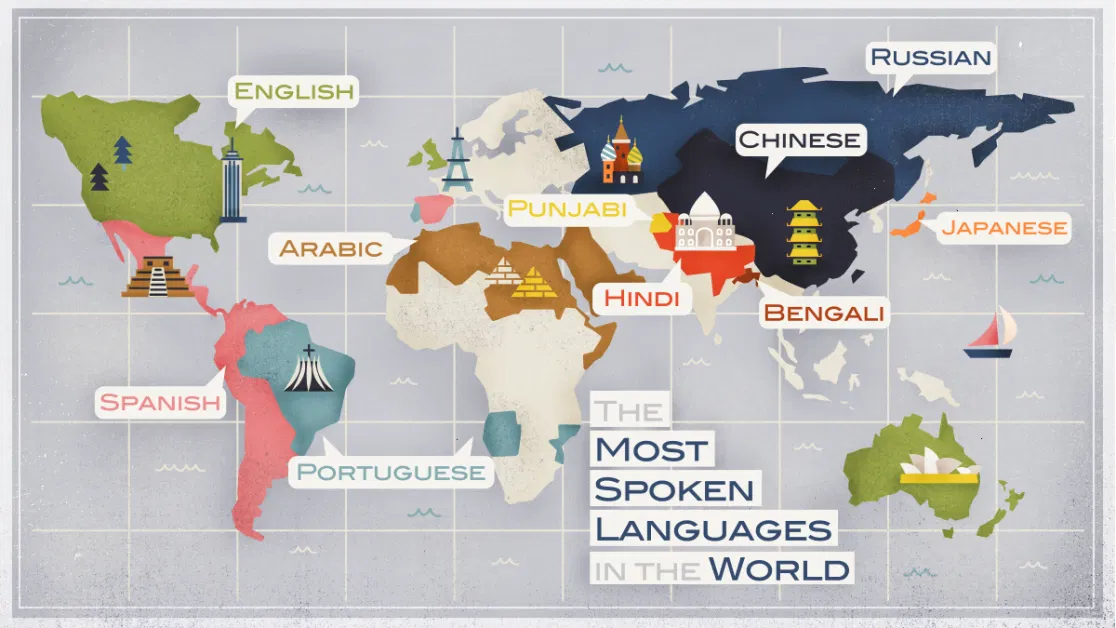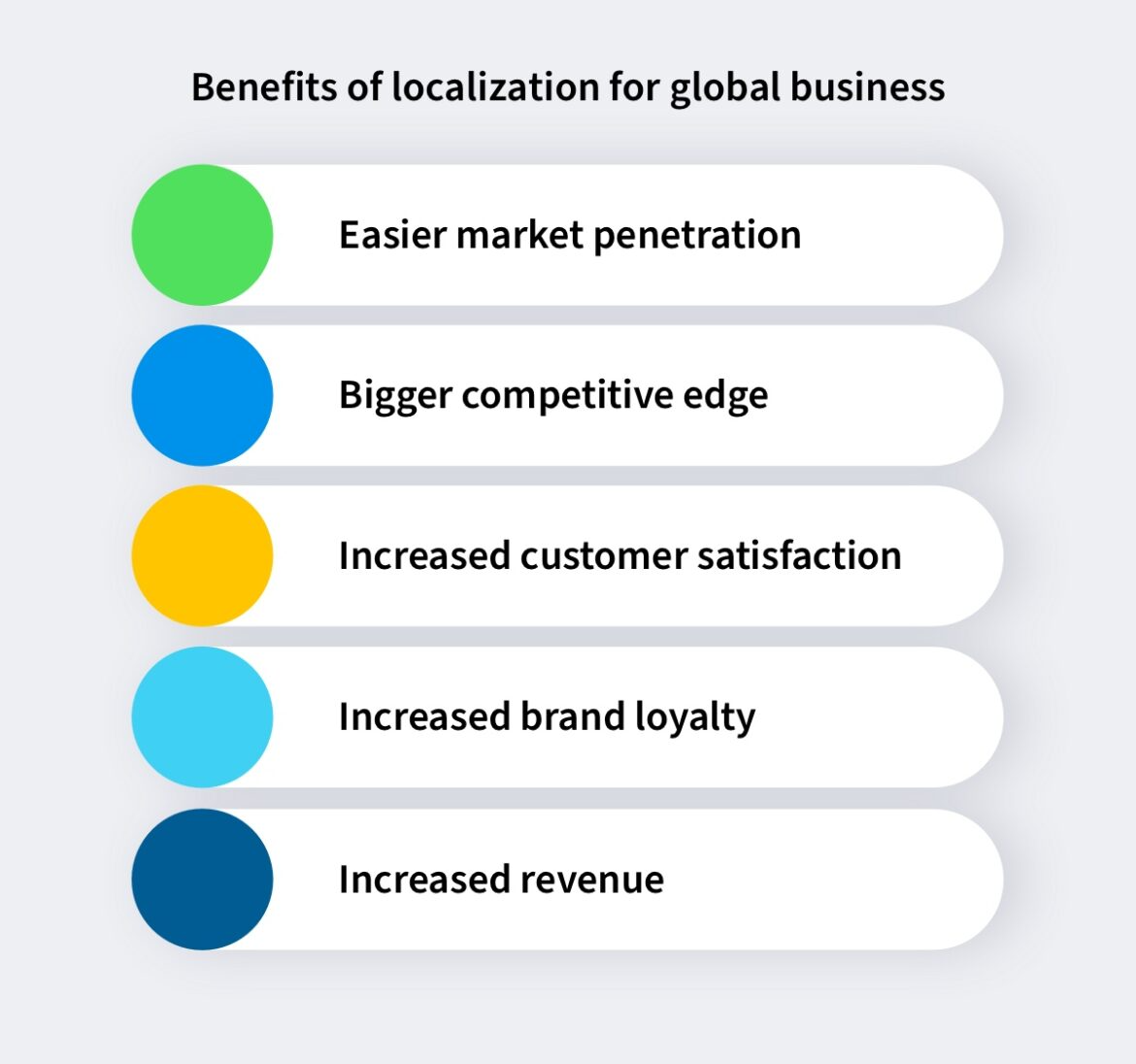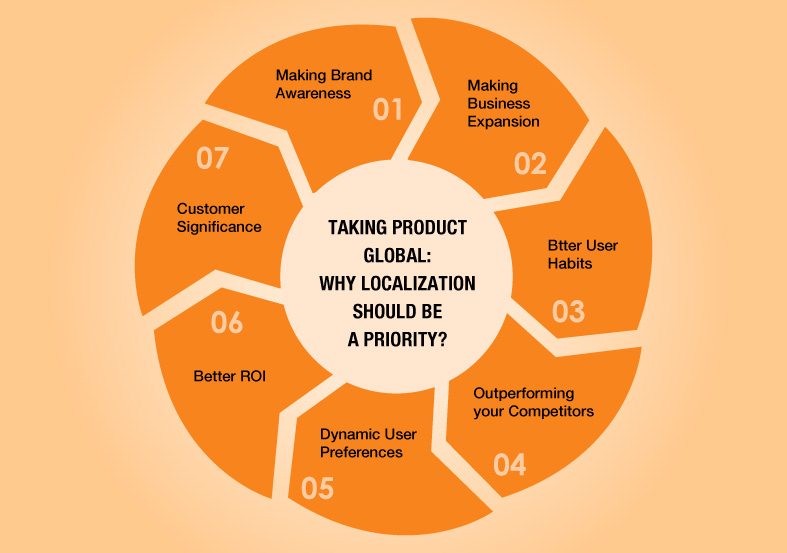To Localize or Not to Localize: Global Expansion and the Benefits of Localization
As of 2022, more than 6,000 languages are being spoken around the world. It’s hard to imagine such diversity when most of us grow up speaking one or two—perhaps even three—languages at most. 5.03 billion people currently have access to the Internet; the sheer amount of linguistic diversity one can experience online is impressive. However, despite the prevalence of English, only 25.9% of the 5.03 billion internet users are English speakers (Data Reportal, Statista); in other words, business done in a single language is only partially effective at best, even when carried out in English. Linguistic barriers stand in the way between people as they attempt to communicate with one another.

An overview of global internet user statistics. Image credits: DataReportal
The same goes for other languages. Trailing closely behind the 1.132 billion English speakers of the world is Mandarin at 1.117 billion. A little ways behind, in third place, is Hindi—spoken as both a native tongue and lingua franca mainly in India—at 615 million, and then Spanish at 534 million speakers. After that is French, Arabic, Bengali, Russian, Portuguese, and Indonesian. The data shows that the world exists in these linguistic spheres; facilitated by the ease of communication, companies and businesses within these spheres can freely collaborate with each other and satisfy the needs of that linguistic population, but have a hard time reaching outside of their respective spheres.

A map illustrating the ten most spoken languages in the world. Image credits: Babbel
And there is much, much to be gained by looking beyond one’s linguistic barriers. An article in the American Express notes some of the many benefits to be gained by trading internationally across linguistic boundaries. Companies can benefit from increased revenues; the 2016 FedEx Trade Index surveyed 1,004 small business leaders, revealing that “business leaders engaged in global trade say they’re growing faster and hiring more employees than small businesses who stay stateside.” Furthermore, companies that trade internationally can enjoy decreased competition—not having to compete for limited space within their linguistic zone—and enhance their reputation in other parts of the world. Other benefits of international trade include easier cash-flow management, better risk management, benefiting from currency exchange, and access to export financing, among others (American Express).
There are other reasons why companies should look to open up their horizons beyond their boundaries. For one, 51.8% of the world’s internet users are in Asia. More than 50% of all searches on Google are in a non-English language. China—not the United States—is the world’s largest app market (Phrase). Perhaps most shocking of all: “about 40% of internet users will never buy from websites in other than their native language” (CSA Research). To reach this 40% of users, localization is a must, especially if you’re operating your business or company in a non-English language. In other words, localization opens up one’s business and enterprise to other major international markets.
According to the same research carried out by CSA Research, around 75% of online shoppers claim to be open to purchasing more from a website if the “aftersales care is in their language.” Almost 76% of internet users “prefer to read product information in their native language.” This is the case even in Sweden—a country boasting one of the world’s best non-native English speakers—“over 80% of online shoppers [in Sweden] prefer to make a purchase in their own language.” The familiarity and comfort of encountering a foreign product in one’s own language lie at the heart of international business.

An infographic of the benefits of localization. Image credits: OneSky
This is why localization is so necessary. To integrate one’s business into the global network of supply and demand, localizing one’s products and services into the language and culture of a target region is imperative; localization is no longer a choice, but a necessity. Localization is a seemingly easy process—nothing more than the cultural and linguistic conformity to a certain culture and language, but there are layers to the process, each requiring much expertise, knowledge, and consideration that only localization experts can provide at agencies such as Sprok DTS. One must go about localizing their product with a strategy and course of action in mind; simply diving into a foreign market will automatically lead to increased revenue and facilitate trade.
An article on Phrase explains the benefits and results of localization in greater detail. First, localization allows companies to enter new markets with ease. Extending one’s product range and services to a different region entails “legal issues, logistical hurdles, and also cultural and communication challenges,” but localizations can help ease the stress and burden of these issues by helping the company integrate their product or service better into the flow of the new market. Second, localization helps companies beat out their competitors. Companies that enter new markets can beat out local markets with increased revenue from said new markets, all the while competing head-on with global competitors who might not have the same expertise or the specific kinds of products or services you might happen to offer.
Phrase also notes that localization helps boost customer satisfaction. After all, the purpose of localization is to communicate one’s product and service—and as a result, the company’s ethos and message—to a new market. By catering to the cultural and linguistic expectations of the consumers in a new market, companies can better attract new customers, who realize that the company in question is dedicated to communicating with them. Another related benefit is an increase in brand loyalty: “If you provide your buyers with a satisfying user experience you will start to gain their trust… Communicating with your users in their native language and tailoring your product will help you gain their trust” (Phrase). Most importantly, localization will lead to an increase in revenue. We already mentioned this before—that branching out one’s enterprise into international markets will increase revenue—but the only way to successfully do so is to localize one’s products and services.

An infographic on specific benefits of globalization and localization. Image credits: Phrase
All this being said, companies and industries dealing with highly technical products or services run into additional problems. Unlike normal localization strategies—which are more geared toward marketing—technical companies must deal with more specific localization techniques that will ensure that their technological product can function properly in another language. These technologies pertain to a wide range of applications, from industrial products to computer software; companies working with such products must work with localization experts to make sure everything translates, both in language and in science, into another culture.
A good example of such technological localization—closely associated with the notion of internationalization, or localization to fit the technological standards of another region is explained in this article by OneSky. Taking an app as an example, the article explains that “you must enable your app to support various languages and symbols across different markets and cultures (e.g. left to right script vs. right to left, $ vs. €)” (OneSky). Websites are another example; translation and localization of online sources must be carried out in a way that does not affect or damage the infrastructure of the website, abiding by certain coding standards and rules. The localization expert, then, must be skillful in not only the target language, but also retain basic knowledge regarding coding. Furthermore, the specialist utilizes the following practices to ensure their job is carried out efficiently: encoding website content in Unicode (UTF-8), developing to remove barriers that might impede localization or international deployment (text resizing, etc.), incorporating predefine localization data and features (e.g. date, time, currency, etc.), among others (Phrase).
Thankfully, there are systems and tools that help localization experts do their jobs more efficiently and accurately. Phrase briefly touches on the several tools localization specialists use in their jobs: translation management systems (TMS), computer-assisted translation (CAT) tools, machine translation (MT), linguistic quality assurance (QA) tools, and terminology management tools (Phrase). These tools help not just with localizing apps and websites, but also with technical manuals and instructional leaflets. Technical manuals require stricter adherence to given terminology, and the above features help localization specialists ensure conformity in their word choices and terminology use.

An infographic describing the benefits of localization. Image credits: LinguaSol
Here at Sprok Document Translation Services, we utilize the most up-to-date technology and translation systems to ensure that our services cater to our customers beyond their greatest expectations. Our translators and localization experts are equipped with the experience and online infrastructure to properly carry out their tasks—from translating technical industrial manuals to localizing marketing content, among numerous other jobs.
References
https://phrase.com/blog/posts/how-important-is-localization-for-your-business/
https://www.oneskyapp.com/blog/localization-statistics/
https://datareportal.com/global-digital-overview
https://www.statista.com/statistics/262946/share-of-the-most-common-languages-on-the-internet/
https://phrase.com/blog/posts/9-steps-to-get-your-website-localization-started/
https://www.hicom-asia.com/when-good-brands-go-bad-localization-gone-wrong/
https://www.babbel.com/en/magazine/the-10-most-spoken-languages-in-the-world
https://www.linguasol.net/taking-product-global-why-localization-should-be-a-priority
https://www.americanexpress.com/en-us/business/trends-and-insights/articles/advantages-international-trade/
https://insights.csa-research.com/reportaction/305013126/Marketing
https://newsroom.fedex.com/newsroom/global-english/fedex-trade-index-trade-big-deal-small-business